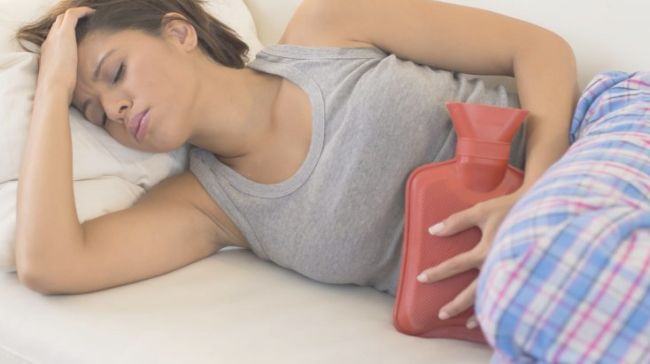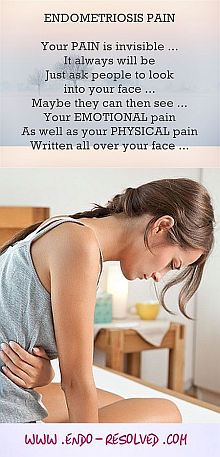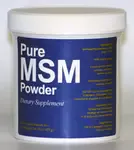Endometriosis and pain management
Endometriosis - the invisible pain.....
The pain associated with endometriosis is the most difficult symptom to cope with for nearly all women. For many, the agony they suffer can severely interfere with every day life. It can be constant or it can be cyclical and normally coincides with a woman’s period. Pain can also be exacerbated during an endometriosis flare which along with pain can cause a host of other debilitating symptoms. One huge problem for women with endometriosis is the classic case the 'your pain is invisible.' Therefore women are not taken seriously at all and their pain is dismissed, especially by the medical profession.
Many with endometriosis often end up in the E.R as they just can't cope only to be dismissed with a prescription for pain killers and told to go home and rest!!!!
What is causing your pain?
As well as coinciding with menstruation the pain symptoms of endometriosis can also be present at other times of the month. There can be severe discomfort with ovulation, as well as pain associated with adhesions, or caused by inflammation in the pelvic cavity, and problems caused during bowel movements especially if endometriosis has infiltrated the bowel.
It can sometimes occur during urination, as well as during general bodily movement i.e. exercise, from standing for too long. And the final insult, pain can develop during or after intercourse.
Additionally, pain the occurs in pelvic area can be caused by gut distress and digestive issues like SIBO (Small Intestinal Bacterial Overgrowth), Irritable Bowel and Coeliac Disease.
Normal or Suspicious Pain!
The fact that society in general views pelvic/menstrual pain as normal means that women themselves also led to believe it to be normal. This is why it takes so long for them to realise that something is actually wrong. They may start to discuss and compare their menstrual symptoms with others and gradually they realise that the amount of discomfort they feel is not normal.
If you are reading this and suspect that you may have Endometriosis because of the amount of pain you suffer with your periods, you are well advised to get this checked out with your doctor.
Location of pain
Most sufferers with Endometriosis experience pain that is focused in the pelvic area. It is often severe cramping that occurs on both sides of the pelvis, radiating to the lower back and rectal area and even down the legs.
Occasionally discomfort may occur in other regions. Implants can also occur in the bladder (although rare) and cause distress and even bleeding during urination. Endometriosis can also invade the intestine and cause painful bowel movements or diarrhoea. Large cysts commonly rupture and cause very severe symptoms in various locations of the pelvic cavity.
Severity of pain
The level of discomfort and pain varies widely and is not related to the extent of the disease. A woman can have very small or few implants and have severe symptoms, while those with extensive Endometriosis may have very few signs and not suffer much. There is no logic as to how severe the discomfort of Endometriosis will be, but on the whole this disease causes severe pain for most sufferers.
Help with managing your pain

There are options available for the management of pain within conventional modern medicine These can include a variety of drug treatments which are prescribed by your doctor. Drug treatment is not the best option for relief because of the long term side-effects. They may be helpful for short-term use or during post-surgery but using strong medications can cause damage to the liver and destroy your much need gut bacteria.
The two pain relief drugs that are used most commonly for Endometriosis are:
Non-steroidal Anti-Inflammatory Drugs (NSAIDs)
These are a class of drugs which are designed to relieve pain as well as reduce inflammation. These drugs may vary in degrees of analgesic versus anti-inflammatory activity. This means that one drug may have a great anti-inflammatory properties, but provides little in the way of pain reduction. Whereas another drug may primarily have better painkiller benefits but has little ability to reduce inflammation.
There are many versions of these drugs which are available both by prescription and over the counter. Aspirin is a common NSAID; others include ibuprofen, naproxen, ketoprofen, all of which are sold under a trade name, so ask your pharmacist for advice. These drugs block the prostaglandins which are inflammatory factors strongly associated with Endometriosis, which increase uterine contractions and cause cramping and pain.
Please note: Drugs containing codeine should not generally be used for Endometriosis pain management. They can cause pelvic congestion and constipation, which could exacerbate symptoms.
GnRh Agonists
The GnRH class of drugs are becoming more widely used as a means to control the symptoms of Endometriosis. GnRH stands for Gonadotropin Releasing Hormone and they are regularly prescribed for treatment of Endometriosis with the aim to reduce the symptoms.
They alter the natural hormone levels of the body and chemically induce a state of menopause. This is to provide time for the Endometriosis implants to shrink, because they are not being fed by the natural cycle of hormones, namely oestrogen.
This method of treatment appears to be relatively effective for some women in helping to relieve the symptoms as well as temporarily working to shrink the implants. But these drugs have various side-effects, causing different problems for those who use them.
These drugs are only approved for use for six months of treatment. This is due to the possibility of loss of bone mass, which is supposed to be recovered after discontinuing treatment. The option to stop bone loss during this treatment regime is to give additional hormone therapy called 'Add-Back' therapy.
Natural options
T.E.N.S for symptom relief
Transcutaneous electrical nerve stimulation (TENS) is a drug-free method of symptom relief that has been used to treat a wide variety of muscle and joint problems, as well as many other painful conditions.
TENS uses electrical impulses to stimulate the nerve endings at, or near the site of pain, diminishing the symptoms and replacing it with a tingling or massage-like sensation.
TENS can be used in a health-care setting, but most often people use it at home, by purchasing their own equipment. It is a safe, non invasive, drug-free medically proven method of pain management.
Supplements for Pain Relief
Many sufferers have found that various natural remedies have helped with their pain. These may include vitamin and mineral supplements, herbs and diet changes.
Evening Primrose oil has had good results for many, both for Endometriosis and PMS. It contains a polyunsaturated fatty acid known as gamma linolenic acid, which seems to block the releases of cytokines and prostaglandins, substances that are manufactured by the endometrium and are involved in uterine muscle contraction and cramping. Foods that contain gamma linolenic acid are black currant oil and cold-water fish.
There are many changes you can make in your diet that will improve symptoms and in turn will improve the pain. This also includes a number of supplements and herbs which will help to cleans your system, boost your immune system, increase your energy and improve your overall health. Find out about many supplements that act as natural pain treatments HERE
Reference:
https://www.endometriosis-uk.org/pain-relief-endometriosis
https://www.everydayhealth.com/hs/living-with-endometriosis/ways-to-relieve-endometriosis-pain/
 As featured in:
As featured in:



